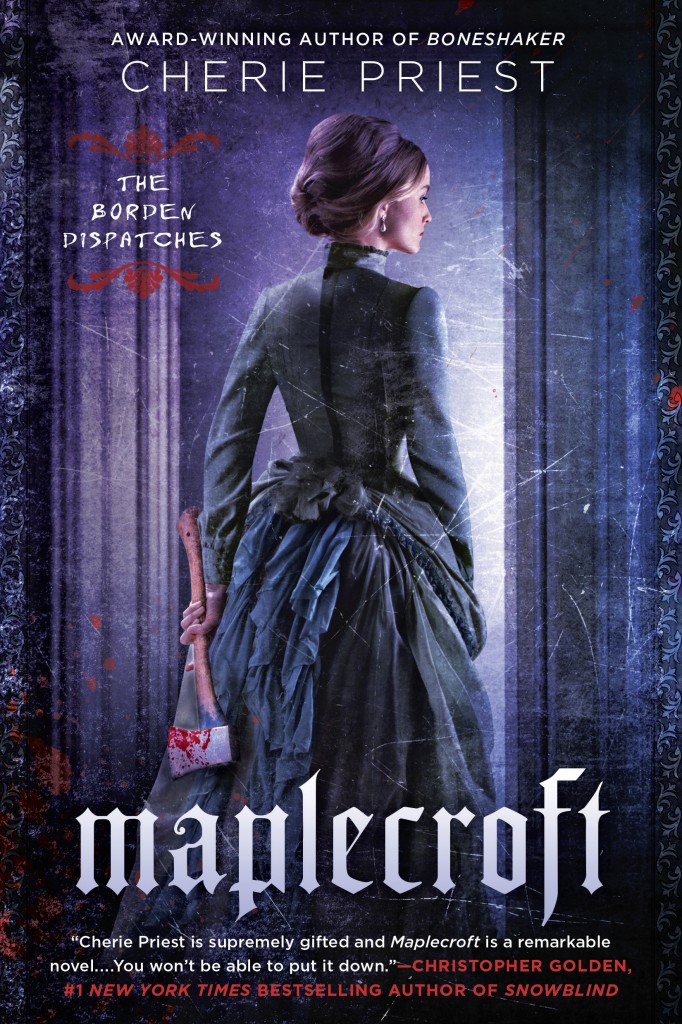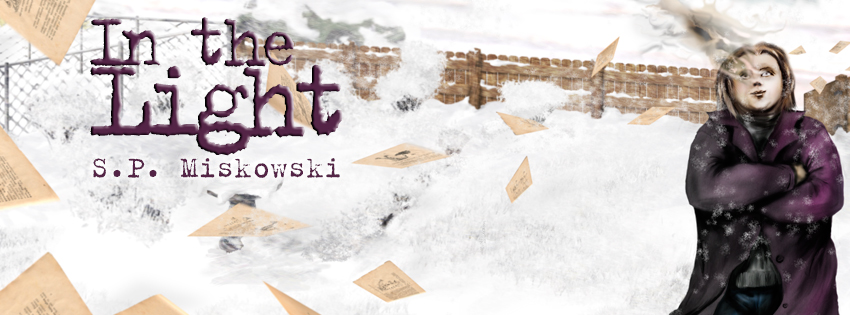Welcome to this week’s installment of The Scariest Part, a recurring feature in which authors, comic book writers, filmmakers, and game creators tell us what scares them in their latest works of horror, dark fantasy, dark science fiction, and suspense. (If you’d like to be featured on The Scariest Part, please review the guidelines here.)
I am very pleased to have Hugo and Nebula Award-nominated and Locus Award-winning author Cherie Priest as my guest. Her latest novel is the highly anticipated Maplecroft. Here’s the publisher’s description:
“Lizzie Borden took an axe and gave her mother forty whacks; and when she saw what she had done, she gave her father forty-one….”
The people of Fall River, Massachusetts, fear me. Perhaps rightfully so. I remain a suspect in the brutal deaths of my father and his second wife despite the verdict of innocence at my trial. With our inheritance, my sister, Emma, and I have taken up residence in Maplecroft, a mansion near the sea and far from gossip and scrutiny.
But it is not far enough from the affliction that possessed my parents. Their characters, their very souls, were consumed from within by something that left malevolent entities in their place. It originates from the ocean’s depths, plaguing the populace with tides of nightmares and madness.
This evil cannot hide from me. No matter what guise it assumes, I will be waiting for it. With an axe.
And now, let’s hear what the scariest part was for Cherie Priest:
For quite some time, I’ve nursed a pet theory that there are only two great fears: (1) the fear that everyone knows something life-or-death important, and no one will tell you what it is, or (2) the fear that you know something life-or-death important, and no one will believe you. At the core of both, I suppose, is the fear of isolation and/or being left out of something, which comes around again to the age-old fear of the unknown; but the academic in me has a fondness for the symmetry of it all.
I find it both tidy, and true.
So when I approached the aftermath of the murders which Lizzie Borden may — or may not — have committed, it’s no great surprise that I was struck by the woman’s isolation. She stood at the center of a media frenzy, a town’s wrath, and a justice system’s glare . . . and she stood there more or less alone. If she didn’t do it, she sure as hell didn’t deserve the aftermath of that trial.
If she did do it, then I’m not entirely sure you could say that she got away with murder. Was formal justice served? No, but public social justice saw to it that she basically never left the house again. Entire generations learned (and assumed, and believed) she was guilty via schoolyard jump rope rhymes, for pity’s sake.
So did she kill her father and stepmother, or was she railroaded? I don’t know. Nobody does anymore, because the only person who ever knew for certain was Lizzie herself — and she’s been dead for almost a hundred years. But I was intrigued by the idea of it all, how she never spoke a word to the press, not even to defend herself; and then, when it was all over she was free to go . . . but she didn’t. She bought a house right there in that same town where public opinion had utterly condemned her, never mind the verdict.
And there, she lived out her days, more or less alone.
So I wondered, what would keep her there? She had very little family left — only an older sister who was rather infirm. She had plenty of money, having inherited the substantial Borden estate; she could’ve gone anywhere she wanted.
Maybe she was afraid.
That’s the direction I took it, anyway. I decided to go ahead and make her guilty, but to give her a damn good reason for her infamous crime — something so terrible, so great a threat, that there was nowhere she could possibly run in order to escape it . . . so she might as well stay put and fight.
Because if Lovecraft taught us anything (apart from what “Cyclopean” means in the architectural sense), he taught us to make the threat bigger than the protagonist. In Maplecroft, the threat is enormous. It comes from within, and without — from family, from lovers, and from home. It comes from the ocean, and it isn’t stopping. Maybe it can’t be stopped.
Caught in the middle is Lizzie, who knows something life-or-death important. But no one will believe her, much less help her.
And that’s the scariest part.
Cherie Priest: Website / Twitter / Facebook
Maplecroft: Amazon / Barnes & Noble / IndieBound / Powell’s
Cherie Priest is the author of more than a dozen novels, including the steampunk pulp adventures of the Clockwork Century, beginning with Boneshaker. She also wrote the Cheshire Red series from Bantam-Spectra; Fathom and the Eden Moore series from Tor; and three novellas from Subterranean Press. In addition to the above, her first foray into George R. R. Martin’s superhero universe, Fort Freak (for which she wrote the interstitial mystery), debuted in the summer of 2011. Her short stories and articles have appeared in many fine periodicals and numerous anthologies; and her most recent full-length project, Maplecroft, is the story of Lizzie Borden fighting Cthulhu with an axe. Cherie lives in Chattanooga, Tennessee, with her husband, a big shaggy dog, and a little old cat.





